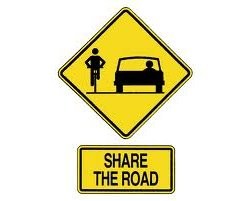
To all road users - The case for cycling and safer roads for all:
Over the last two weeks there has been a great deal of attention given to cycling. As leaders in the cycling community; BikeNZ and the Cycling Advocates' Network (CAN) feel this open letter is warranted, as we want more New Zealanders to enjoy the pleasure and benefits of cycling without fearing for their lives. We don't consider cycling a dangerous activity and believe some of the recent commentary has been ill-founded and irresponsible.
We would like to make a number of important points in the debate on how to make our roads safer for all.
Cycling is a healthy exercise. Regular cycling reduces illness. Cycling doesn't burn expensive fossil fuels, so more cycling equals a lower import bill and less pollution. Bicycles don't take up as much space as a car and so increased cycling reduces road congestion. The number of people cycling continues to grow and most adult cyclists also drive a motor vehicle, so let's please stop this 'them and us' debate and look at how we can make getting from A-B safer and more enjoyable for all road users.
One of the key themes of the last two weeks has been the dangers inherent in cycling. However, the facts suggest cycling is not particularly dangerous, especially if you cycle responsibly. Yes, we had a terrible week and consequently a great deal of media attention, but this is partly because cycling deaths are rare. On average fewer than 10 people die annually while cycling. That pales into comparison to the 300 motorists killed each year. Based on Ministry of Transport statistics, the average person has to ride for more than 25,000 hours before having a significant accident, and the chance of death is 80 times less again.
There has been much debate about cyclist behaviour and especially the problems associated with bunch riding. We believe this need to be put in context. Picking Auckland as a representative example, almost all bunch riding occurs before 8am during the week and on Saturday and Sunday mornings, and they stick to regular routes. Yes, we want cyclists to improve their on-road behaviour, but these riders are not generally on the road during "rush hour" and they stick to regular routes. The amount of time an average motorist is 'delayed' by cyclists each week is insignificant and this needs to be acknowledged and accepted.
This brings us to what can be done to make roads safer.
We know where most cyclists ride so let's make those roads safer by thinking about cyclists' needs as well as drivers needs. We also know the more skilled a cyclist, the better they will cope with the unexpected, so ensure everyone has the opportunity to undertake a cycle skills training programme that include understanding the road rules and what responsible riding means. Thirdly, we need to reduce the aggression and antagonism between all road users and develop a ‘Share the Road' culture.
BikeNZ and CAN, along with our regional groups, are renewing our efforts to persuade NZTA and local councils to address ‘pinch points' and danger areas. The Tamaki Drive site where Ms Bishop was killed had been identified by Cycle Action Auckland in 2006 as a danger spot, but it has taken until her death for the simple recommendation of removing four car parks to be actioned. That 2006 report identified several other danger spots and we urge the council to act before we have another tragedy.
Widening shoulders on popular rural cycling routes is another action that will make a major difference to road safety. Identifying danger spots and ensuring that there is a 'cycling shoulder' should be a key target for the local council and NZTA. Wider road shoulders and better design around pinch points will not only save lives but reduce driver frustration by providing more room for passing.
BikeNZ and CAN are rolling out cycle skills training programmes for both children and adults as funding allows. We believe our programmes save lives and hope that organisations with an interest in transport like NZTA will help fund these valuable programmes.
While we believe licensing cyclists is unrealistic, we think offering cycle skills training programmes to anyone wanting them will result in fewer accidents, less driver frustration and safer roads. It is also clear to BikeNZ and CAN that young people who have cycled make better drivers. Learning the Road Code is no substitute for several years' experience cycling alongside cars, trucks, buses and other cyclists.
Road user attitudes need to change. A national 'Share the Road' campaign is needed to help all road users understand their responsibilities on the road and how each group's actions impact on others. Ask any motorcyclist or long-haul truck driver what they think of the average motorist and you are unlikely to get a favourable reply. It is not just cyclists and the non-cycling motorist that frustrate each other. The 1.5-metre safe passing distance campaign is supported by CAN and BikeNZ but we believe it is now time for a nationwide, high-profile Share the Road campaign.
In summary, CAN and BikeNZ appeal to all road users to respect the road rules and other road users. Cycling is a healthy, efficient and enjoyable means of getting from A to B. The number of cyclists will continue to increase, so we call upon local councils and transport agencies to alter current roads to make them safer and to incorporate cycling needs in new road design. Finally we want to provide cycle training programmes for all New Zealanders and look again to local council and transport agencies for funding to make this a reality.
Richard Leggat, ChairBikeNZ Board
Graeme Lindup, Chair, Cycling Advocates' Network
